Jimmy Carter (born October 1, 1924). The son of a farmer and a registered nurse, Carter was educated at local public school in Georgia before spending a year at Georgia Southwestern University and then entering Georgia Institute of Technology as a naval ROTC cadet. In 1943 he entered the US Naval Academy at Annapolis — a childhood ambition — graduating in 1946 and being commissioned as an Ensign in the US Navy. Shortly after graduation, he married Rosalynn Smith, from Plains. After two years of service on experimental radar and gunnery vessels, he switched to submarines. On one occasion, he came close to being lost at sea, after being swept from the submarine bridge during a storm. He subsequently applied, and was accepted, to participate in the nuclear submarine construction programme directed by Admiral Hyman G. Rickover. He took courses in nuclear physics and reactor technology at Union College, New York. His naval career was cut short in 1953 when his father died, at a relatively early age, of cancer. He returned home to Plains to run the family peanut-farming and fertilizer business, despite the protestation of his wife. After some lean years, he built the family concern into a prosperous business. He also began to get involved in civic and church affairs, making a name for himself by being the only person locally to refuse to join the racist White Citizens' Council. He also started to take an interest in elective office. His father had been elected a member of the state assembly the year before he died and had encouraged his son to take an interest in public affairs. The principal spur to seeking office, though, came several years later when Carter served as chairman of the local school board. A proposal from the board was subject to a local referendum and he went round giving speeches in support of the proposal. The proposal was narrowly defeated. He made his first bid for elective office in 1962, seeking election to the State Senate. After a bitter primary contest — in which he had to resort to court action to overturn the corrupt practices of his opponents — he won the general election and served two terms (1963 – 7). He took a particular interest in election reform and improving the education system. He was also a regular opponent of "sweetheart bills", giving particular individuals breaks on salary or retirement benefits. His autobiography, Why Not the Best?, written before he won national office, also reflected a dislike of lobbyists. In 1966 he announced his intention to run for the US Congress, but after the leading Democratic contender for governor had a heart attack and withdrew from the race, Carter was persuaded to seek the nomination. He lost the nomination to a segregationist, Lestor Maddox, and resolved to contest the nomination again in 1970. After an intense period of planning and campaigning, he was successful the second time round. In the interim, he became a Born Again Christian. As Governor, he reorganized government, reducing significantly the number of agencies and streamlining the administration. He implemented a number of public sector reforms and increased the number of blacks appointed to public office. He disliked patronage and compromise, and preferred rallying popular support for his measures among voters to bargaining with members of the state legislature. He also sought to raise Georgia's profile abroad, undertaking ten overseas visits in order to promote trade and inform himself about other countries. In 1972 he began to think seriously about running for President. He served as chairman of the National Democratic Party 1974 Campaign Committee, giving him experience of campaign organization and strategy. In the autumn of 1974 he announced his candidacy for the 1976 presidential nomination. He completed his term of office as Governor in 1975 and thus had time to campaign unfettered by responsibilities of office. The field of candidates increased but Carter scored a major success early in 1976 by topping the poll in the New Hampshire primary. This established him as the front-runner and generated a bandwagon effect. He won six of the first eight primaries. Despite some setbacks — he polled badly in New York and Massachusetts — his opponents were gradually eliminated. By early June he had enough delegates to be assured of the nomination. He had announced in advance that he would select Senator Walter Mondale as his running mate. He began the general election with a clear lead over the Republican, President Gerald R. Ford. Ford was the successor to Richard Nixon, who had resigned in disgrace over the Watergate scandal. Ford had kept on various Nixon appointees and had pardoned Nixon for any offences he may have committed. The situation favoured the Democratic candidate. However, Carter's support slipped as the campaign progressed — his Southern speaking style worked to his disadvantage and he performed below expectations in the first televised debate with Ford — but he held on to win with a 2 per cent margin of victory. He polled well among blacks and blue-collar workers. He was the first Georgian to be elected President and the first President elected from the deep South since 1848. In the White House, Carter tried to set a high moral tone. He stressed human rights in international affairs and opposed "pork barrel" legislation at home. In domestic affairs, he stressed the need for energy conservation and sent a major Energy Bill to Congress. He persuaded Congress to approve a major reform of the civil service, something that his predecessors had failed to achieve. In foreign affairs, he obtained Senate approval — by one vote — for the Panama Canal Treaty, restoring the Canal to Panama. In 1978 he hosted a meeting at Camp David with President Anwar Sadat of Egypt and Prime Minister Menachim Begin of Israel, resulting in the Camp David Agreement in which both signed up to a peace framework. In the sector of defence, he departed from past policy and cancelled the B1 bomber project. He also vetoed a measure for a $2 billion dollar nuclear carrier; Congress failed to override his veto. He also persuaded Congress to lift the arms embargo on Turkey. However, Carter's successes in the office were sporadic rather than consistent. His relationship with Congress was not a harmonious one. He had fought the election as an "outsider" to Washington and now had to work with the institution that formed part of the establishment he had attacked. His narrow victory had denied him a coattails effect. The Democrats were well entrenched in both Houses, but with the members not owing their victory to the President. Carter adopted a high moral stance, assuming that Congress would recognize the rightness of his measures. He sent several measures to Congress at the same time and then failed to lobby for them. His Energy Bill got bogged down and emerged eventually in a somewhat emasculated form. Though most of his measures were passed, his success rate in Congress — just over 75 per cent — was markedly lower than for his Democratic predecessors Lyndon Johnson and John F. Kennedy and only marginally better than that achieved by the Republican Dwight Eisenhower. Carter surrounded himself with advisers drawn from Georgia — dubbed "the Georgia Mafia" — who had no real grasp of Washington politics. A number of important measures, including a Labour Law Reform Bill, failed. Carter appeared increasingly out of his depth. The Camp David Agreement produced a temporary increase in popular support, but his standing soon fell back to low levels. In foreign affairs, crises appeared to be the norm and he appeared surprised by events. The fall of the Shah of Iran and the Soviet invasion of Afghanistan caused particular difficulties and highlighted the incapacity of the US government to do much about either. Carter cut off grain sales to the USSR and encouraged a boycott of the 1980 Olympic Games in Moscow — neither having much impact — and his decision to allow the former Shah into the USA for medical treatment sparked the seizure of hostages in the American embassy in Tehran. The holding of the hostages dented Carter's already fragile public support. In desperation, he authorized a rescue attempt that ended in failure. Until 1980, Carter experienced low popular ratings because of poor economic performance. Inflation and unemployment were rising and there was little optimism about future prospects. Perceptions of poor performance were then compounded by Carter's handling of the hostages crisis. In 1980, with his popularity in the opinion polls lower than that of any president since Warren Harding, he faced a challenge from Senator Edward Kennedy for the Democratic nomination. He fought off the challenge, but it served to demonstrate the turmoil and dissatisfaction within Democratic ranks. In the general election, he was beaten by a clear margin by the Republican candidate, Ronald Reagan. Carter won 35.4 million votes against 43.9 million for Reagan. It was the first time an incumbent had been defeated since 1932. Carter retired to Plains, but maintained an active public career, involving himself in projects to assist Third World countries and occasionally engaging in some international mediation. Great things were expected of Carter when he entered the White House. He was a highly intelligent individual, a problem solver, a Democrat with a Congress dominated by fellow Democrats. Yet he proved to be a failure. He never really grasped what was required of the incumbent of the Oval Office. He tried to do too many things at once, failed to focus his activities, and was too obviously influenced by the last person he had spoken to. He was viewed as a good man, but one increasingly out of his depth. His White House staff were generally viewed by members of Congress as lightweight; a number — including the Director of the Office of Management and Budget, Bert Lance — became embroiled in scandals. The White House was both scandal-prone on occasion as well as accident prone. On a visit to Warsaw in 1978, an interpreter was hired who was not up to the job — translating Carter's words on arrival as "I desire the Poles carnally" and "When I abandoned the United States, never to return" — and Carter's participation in a jogging marathon in Washington was cut short when he collapsed and had to be carried away. Some members of his family also attracted unwelcome publicity, his brother Billy receiving money to provide advice to the Libyan government. There was little observable enjoyment in the final months of his presidency. In the 1982 Tribune poll, Carter was ranked the tenth worst president in US history. He fared a little better in the Murray poll of the same year, being ranked 25th out of 36, one behind his Republican predecessor, Gerald Ford. His public work since leaving office increased his standing in the eyes of the public, though it did little to affect historians' judgement of his presidency. In the 1995 Chicago Sun-Times poll of presidential scholars, he was ranked 22nd out of 38. Though some reassessment of his presidency has occurred, as in John Dumbrell's The Carter Presidency: A Re-evaluation (1993), he has not been subject to a new interpretation. Richard Nixon fared better in the 1995 poll than he did. |
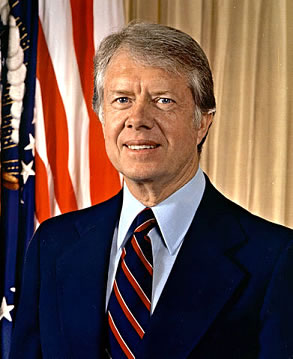 |
Jimmy Carter Born: October 1, 1924 (age 87) Plains, Georgia, U.S.
|
|
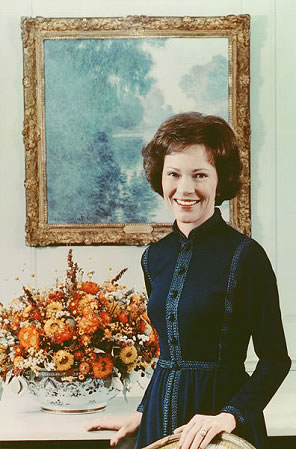 |
|
First lady: Rosalynn Carter |
|
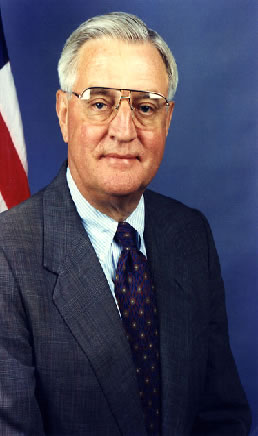 |
|
Vice-president: Walter Frederick Mondale |
|
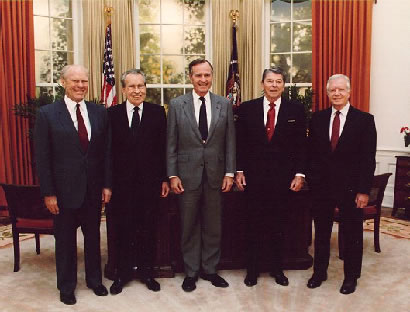 |
|
| Jimmy Carter (far right) in 1991 with President George H. W. Bush and former Presidents Gerald Ford, Richard Nixon and Ronald Reagan at the dedication of the Reagan Presidential Library | |
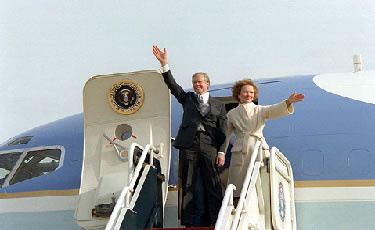 |
|
| Former President and First Lady Carter wave from their aircraft after the inauguration of Ronald Reagan on January 20, 1981. | |
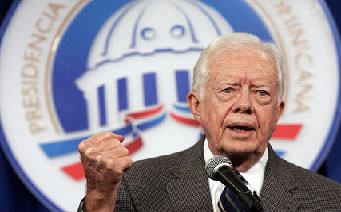 |
|
Jimmy Carter
|
|
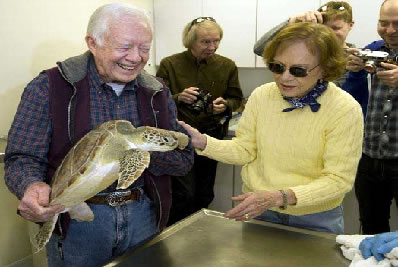 |
|
| Former President Jimmy Carter |